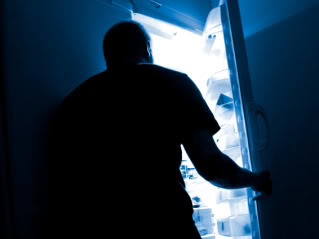- Calls to this hotline are currently being directed to Within Health or Eating Disorder Solutions
- Representatives are standing by 24/7 to help answer your questions
- All calls are confidential and HIPAA compliant
- There is no obligation or cost to call
- Eating Disorder Hope does not receive any commissions or fees dependent upon which provider you select
- Additional treatment providers are located on our directory or samhsa.gov
Night Eating and Binge Eating Disorder

Blog Contributed by Crystal Karges, MS, RDN, IBCLC
Many of us may periodically experience the late night “munchies” or the urge to snack on something during the midnight hours. From a cultural standpoint, late night meals are perfectly acceptable, from the group of college students seeking nourishment while cramming for a test, to the group of friends reconvening around a celebratory dessert.
What if frequent night eating and cravings are indicative of something more severe?
Night Eating Syndrome (NES) is a type of eating disorder characterized by a delayed circadian pattern of food intake [1]. More than a simple midnight snack or desire to interact with others socially, night eating incurs dangerous health consequences and is associated with a psychological component.
Recognizing Night Eating Syndrome
The following are signs that may be apparent in an individual with night eating syndrome:
- Poor sleeping habits: People suffering with night eating syndrome will have difficulty falling asleep and/or staying asleep throughout the night. Insomnia may be commonly experienced among individuals with night eating syndrome.
- Food hoarding: Stashing food away, especially in a bedroom, can be indicative of night eating syndrome.
- Co-occurring disorders or mental health issues: Individuals, who consume an abnormal amount of food during the night hours may do so in attempt to self-soothe, find comfort, or fulfillment. This may be revealing of other issues at hand, such as depression or anxiety.
- Morning Fast: Men and women with night eating tendencies will eat a majority of their food during the evening. This usually results in feelings of fullness upon waking in the morning, influencing a “morning fast”.
In many ways, night eating syndrome mirrors binge eating disorder. People suffering with night eating syndrome often feel as though they are out of control while eating, resulting in feelings of shame and remorse for their eating patterns and behaviors.
In addition, individuals will consume their meals in isolation and eat in secret, often continuing to eat food in spite of feeling uncomfortably full.
Gaining a Better Understanding on Night Eating
While continued research about night eating syndrome is needed to fully understand this eating disorder, drawing greater awareness of this issue is necessary to break the stigmas the may surround this syndrome.
Many people attempt to live their lives normally while struggling with Night Eating Syndrome, and it is important to understand that this is a problematic concern rooted in psychological factors. Research has demonstrated that people who were night eaters had higher scores of depression and lower scores of self-esteem, when compared to those who did not have the disorder [2].
If you or someone you care for is suffering with night eating syndrome, take a step towards healing by seeking professional counseling immediately. Establishing freedom from this debilitating syndrome begins with the courage to find your voice and asserting resolve over the pressures and stigmas that prevent treatment efforts.
References:
[1]: Allison; et al. (2010). International Journal of Eating Disorders 43: 241–247
[2]: Gluck, Marci E.; et al. Night Eating Syndrome is Associated with Depression, low Self-Esteem, reduced daytime hunger, and less weight loss in obese outpatients. Obesity Research. April 2001, Volume 9, Issue 4, 264-267.
